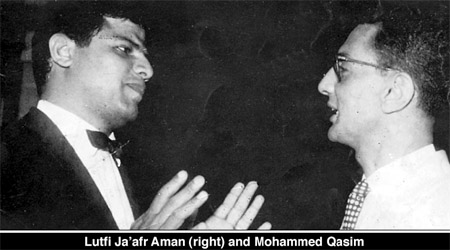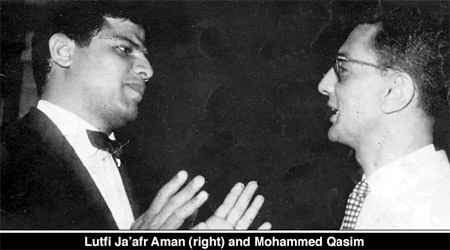
In Commemoration of Lutfi Gafar Aman [Archives:2001/32/Culture]
August 6 2001

Saleh Abdulbaqi
Cultural Editor
Yemen Times
A complete biography of the great Yemeni singer, Lutfi Ga’afar Aman can not be expressed in a few lines. Mo matter what we say about this great personality, we would not be giving him what he deserves regarding his creative talent in his long struggle in the field of literature and songs. His commemoration implies several connotations. He was one of the distinguished pioneers in lyric and romantic poetry in Yemen. He dedicated his whole life for the sake of literature, culture and art. He lived a life full of miseries and despair, all for the sake of his noble mission of enhancing Yemeni literature.
Lutfi Ga’afar Aman was born in Aden in May 22nd, 1928. He completed his secondary studies in the schools of Aden in 1949, when he traveled to Khartoum to continue his higher studies. Then he continued his studies in the UK. Upon his completion of his studies in the UK, he had already occupied several jobs as a headmaster in Aden. He was a painter, an artist, a poet, a composer and critic. He made many wonderful literary and artistic works. He had a leading role in serving the issues of his country through his enthusiastic and expressive poems to revolt against colonization and despotism. Through his poems, he had the gift of easily trigerring emotions of anger and enthusiasm among the people. He wrote many national poems such as “Oh my homeland,…” ( Ya Biladi Ya Nedan Haderan Yaasuf bi) This is the beginning verse of a poem which is was sung by the great Yemeni singer, Mohammed Morshed Nagi. Lutfi wrote many open and frank poems challenging the colonizers and strove with his pen together with his strong will. One of these poems was entitled “The time-honored cry” (Sarkht Al-Majd Attaleed). It was sung by the late great Yemeni singer, Ahmad bin Ahmad Kasem during his stay in Egypt. Consequently, the liberators were pursued and jailed by the British Intelligence. Of those heroes were Abdullah ba Dheeb, Edrees Hanbla and others. Lutfi was a great and frank poet characterized by certain qualities as honesty, credibility and moral courage.
Lutfi’s relation with the Arab and Foreign Literature
Lutfi Ga’afar Anam was a pioneer in the modern Arab literature. He was conversant with all literary eras in the Arab history, including the Pre-Islamic and Post-Islamic literature. He was strongly infatuated with romanticism. His “The Green Path” (Aldarb Al-Akhadhar) poem is a clear indication of his romanticism. In addition to his extensive knowledge in Arab literature, he also knew a lot about English Literature and the pioneers of that literature as Shakespeare and Bernard Shaw.
After his long struggle during the colonial rule, it was the colonizer’s wish to arrest or silence him. At last they had what they wanted and he was arrested and jailed in Abyan. However, after his release after the liberation, he was already overburden with trial and tribulations. His health deteriorated afterwards causing him to travel to Cairo to receive treatment, where his health continued to deteriorate. He wrote his final poem and presented it to the great woman singer, Warda Al-Jazaeria which was composed by Baleegh Hamdi, who was a prominent Egyptian composer. Following his last work, he died in 1970 and was buried in his hometown Aden. He continues to live today in the heart of thousands of his admirers who appreciated what he did for his country and for art.
——
[archive-e:32-v:2001-y:2001-d:2001-08-06-p:./2001/iss32/culture.htm]


